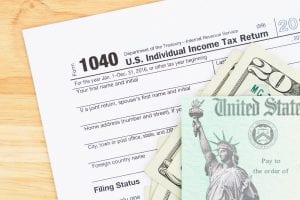If I File For Bankruptcy, Will I Have To Give Up My Tax Refund?

Consider Your Bankruptcy Filing Timing
Whether or not you’re entitled to keep a tax refund when you file for bankruptcy in large part depends upon when you earned the income. If the income that generated the tax refund was earned after the bankruptcy was completed, then you will be entitled to keep the refund. However, if the tax refund was generated from income that was earned prior to filing for bankruptcy, then the refund must be considered part of the bankruptcy estate. The bankruptcy case is comprised of assets that are used to pay off creditors. All hope is not lost for your tax refund, though, as there are some actions you can take to protect your refund money.
Spend Your Tax Refund
One way to protect your tax refund is to spend it prior to filing for bankruptcy. However, if you do choose to spend the refund, it’s important to only put it toward necessary expenditures such as food, rent or mortgage, medical care, utilities or car payments. If you spend it on nonessential items or luxury goods, the bankruptcy trustee could mandate that the refund be considered part of the estate or could even deny your bankruptcy petition altogether, citing bad faith. Using the refund to pay back just one of the creditors versus another could also be considered cause to have the bankruptcy petition denied.
Update Your Tax Withholding
If you’re considering filing for bankruptcy before the next tax cycle, another way to prevent the court from taking your tax refund is to lower the amount of taxes withheld from your weekly or monthly paycheck. This will give you more money each pay period to spend on necessary items like food and rent or mortgage while lowering your tax refund. If you are struggling financially, updating your withholding amount may be a useful strategy to temporarily increase cash flow and protect your money.
Apply For An Exemption
In some cases if you are filing for Chapter 7 bankruptcy, you may be entitled to claim an exemption for your tax refund. When you file for bankruptcy, your case will be assigned to a bankruptcy trustee, who will handle your entire file and make decisions about the amounts that each creditor should be paid. The trustee also determines which property and money is considered ‘exempt’ – meaning, it can’t be taken during a bankruptcy filing. The laws on exempted property and money vary on a state by state basis, but many states offer ‘wildcard exemptions’, which may in some cases include money from a tax refund.
Work With An Experienced Bankruptcy Attorney
If you’re considering filing for bankruptcy and you are anticipating an income tax refund, it’s best to work with an attorney who is intimately familiar with the bankruptcy laws in your state before taking any action or making any decisions. The right attorney will review your case personally and present you with all of your options before recommending a course of action. If you are struggling financially and considering filing for bankruptcy, contact us online . We will make sure you understand all available options and will work to protect your property.
